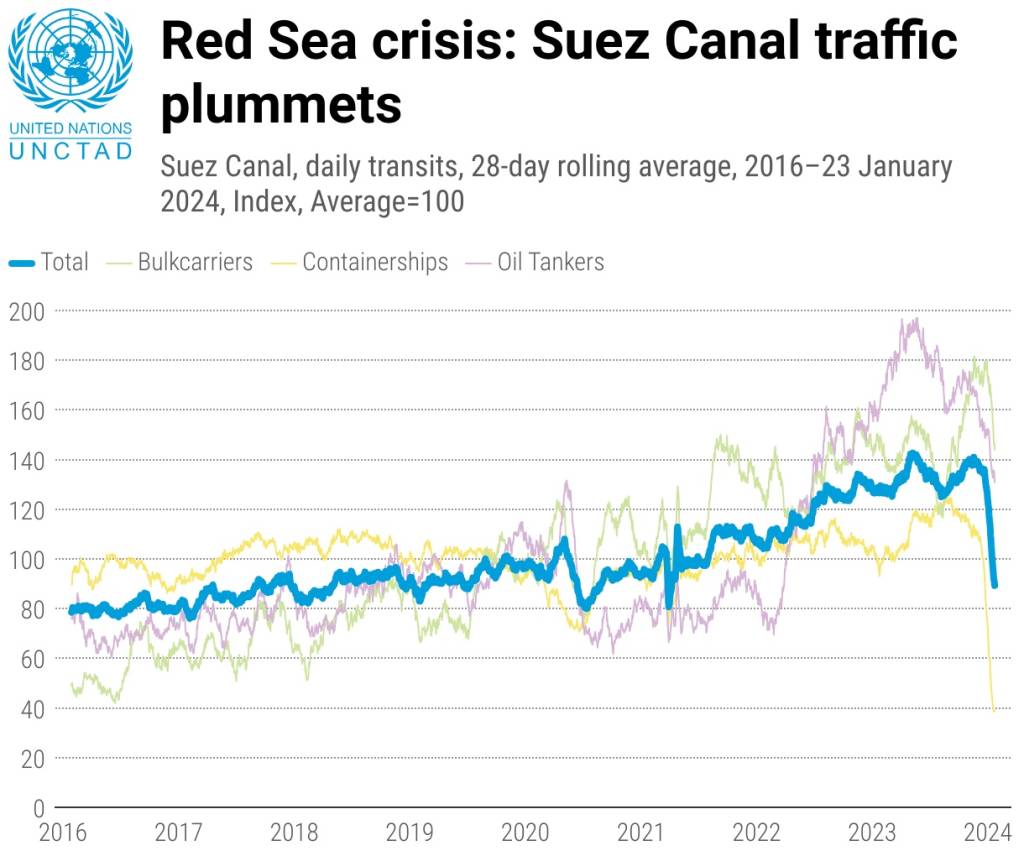The UN’s trade and development agency, UNCTAD, has expressed deep concerns over the increasing disruptions affecting global trade.
According to the agency, recent assaults on vessels in the Red Sea, along with geopolitical strains in the Black Sea region and the repercussions of climate change on the Panama Canal, are contributing to a multifaceted crisis impacting essential trade corridors.
Jan Hoffmann, who leads trade logistics at UNCTAD, presented a comprehensive evaluation of the circumstances during the UN’s daily media briefing on 26 January. He highlighted the pivotal role of maritime transport in global trade, which accounts for about 80% of the worldwide movement of goods.
In 2023, the Suez Canal, which links the Mediterranean Sea with the Red Sea, facilitated 12% to 15% of the world’s trade. Over the past two months, UNCTAD recorded a 42% decline in trade volumes passing through the canal.

The conflict in Ukraine has led to major shifts in the trade of oil and grain, altering traditional trade flows.
The Panama Canal, another vital conduit for international trade, faces challenges due to a severe drought that has reduced water levels, leading to a 36% decrease in the number of transits in the last month compared to the previous year.
Concerns are growing about the lasting effects of climate change on the canal’s capacity and the potential enduring impacts on global supply chains. The situation in the Red Sea, with Houthi-led attacks disrupting maritime routes, introduces additional complexity.
In light of the situation in the Red Sea, key figures in the maritime industry have temporarily halted transits through the Suez Canal, resulting in a 67% drop in weekly container ship transits. There have also been notable decreases in tanker and gas carrier transits.
Shipping costs are on the rise. The last week of December saw a record $500 increase in average container spot freight rates, marking the highest weekly rise to date.
Spot freight rates for container shipping from Shanghai have seen a significant increase, with rates to Europe tripling (+256%) and those to the US west coast going up by 162%, despite these ships not passing through the Suez Canal.
The escalation in insurance premiums is adding to the overall cost of shipping.
Ships rerouted from the Suez and Panama Canals are speeding up to make up for longer routes, consuming more fuel per mile and emitting additional CO2, heightening environmental concerns.
Mr. Hoffmann remarked on the global repercussions of the crisis as vessels seek alternative paths.
UNCTAD has highlighted the extensive economic fallout from these disruptions. The ongoing disturbances, especially in container shipping, pose an imminent threat to global supply chains, potentially leading to delays and increased expenses.
Although current container rates are about half of what they were at the height of the COVID-19 crisis, the knock-on effect of elevated prices on consumers is anticipated within a year.
Energy prices are on the rise as gas shipments are halted, directly affecting energy supplies, particularly in Europe.
The crisis is also inflating global food prices, as longer shipping distances and elevated freight rates could lead to higher costs. Disruptions in grain shipments from Europe, the Russian Federation, and Ukraine are jeopardising global food security, impacting consumers and reducing payments to producers.
“Developing countries are especially at risk from these disruptions, and UNCTAD is closely monitoring the evolving situation,” stated Mr. Hoffmann.
The agency stressed the immediate need for the shipping sector to adapt quickly and for strong international collaboration to manage the swift changes in global trade dynamics.
The ongoing challenges highlight the susceptibility of trade to geopolitical and climate-related issues, calling for collective action towards sustainable solutions, particularly in support of more vulnerable nations.




